16 MIN
TRAVEL TIPS
Savouring Sustainability Wine-hopping Adventures across Greece's Inimitable Islands
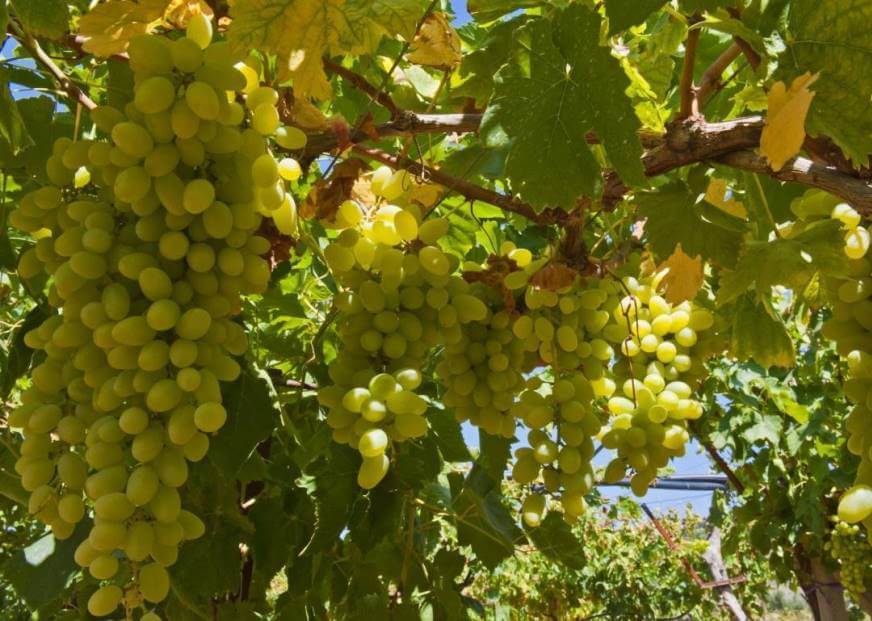
Greece’s rich history and deep-rooted culture are intricately intertwined with its production and consumption of wine. With its numerous wineries focusing on small-scale, high-quality yields, Greece stands out as a significant player in the global wine industry, producing around 5 million litres annually. This production volume places Greece in a unique position as one of the most important wine-producing countries relative to its population and varied viniculture zones.
The quintessence of Greece’s wine diversity lies in its cultivation of 75 local grape varieties, the majority of which are endemic to the country and not found elsewhere. This distinctive grape heritage contributes to the creation of wines that carry a unique sense of place and character — and this makes Greece a fascinating country to visit to experience truly unique wine encounters.
The historical significance of wine in Greece cannot be overstated. Archaeological evidence reveals that Greece boasts the oldest records of crushed grapes, with its winemaking legacy finding its earliest commercial roots in Crete over 4,000 years ago when the region emerged as a pioneer in promoting and exporting its wines throughout the Mediterranean. The storied heritage of Greece’s viniculture extends to its classification systems, with the oldest “appellation of origin” wine hailing from Messinia and bearing the name Denthys. Currently, approximately 30% of the country’s wine-producing zones are dedicated to appellation of origin varieties, primarily concentrated in the regions of the Peloponnese, North Aegean and South Aegean.
Modern developments in the Greek wine industry began in the 1970s, marked by a surge in research and development, including the cultivation of organic wines. Since then, the reputation of Greek wines from small- to medium-sized enterprises has soared in perpetuity, garnering accolades for quality and innovation in prestigious international events. Today, Greece continues to honour its wine culture through regional wine-tasting festivals and expos, which provide an opportunity to explore the blend of tradition and modern winemaking techniques found in the country’s wineries. September holds a special place in the Greek wine calendar, marking the Trygos (wine-harvesting) period. This season is commemorated throughout Greece with fêtes ranging from small gatherings to larger festivities complete with Trygos folklore songs and dances.
As Greece emerges as an enticing destination for wine tourism, its diverse islands stand ready to welcome enthusiasts on an extraordinary journey of culture, nature and sustainability. With a growing trend towards environmentally friendly experiences, Greek wineries have embraced a commitment to nature, making wine-hopping across the Cyclades, North Aegean, Dodecanese, Ionian and Sporades Islands an enchanting and eco-conscious adventure. To fully appreciate the myriad reasons to embrace Greek wine, the invitation is clear taste and savour its richness for yourself…
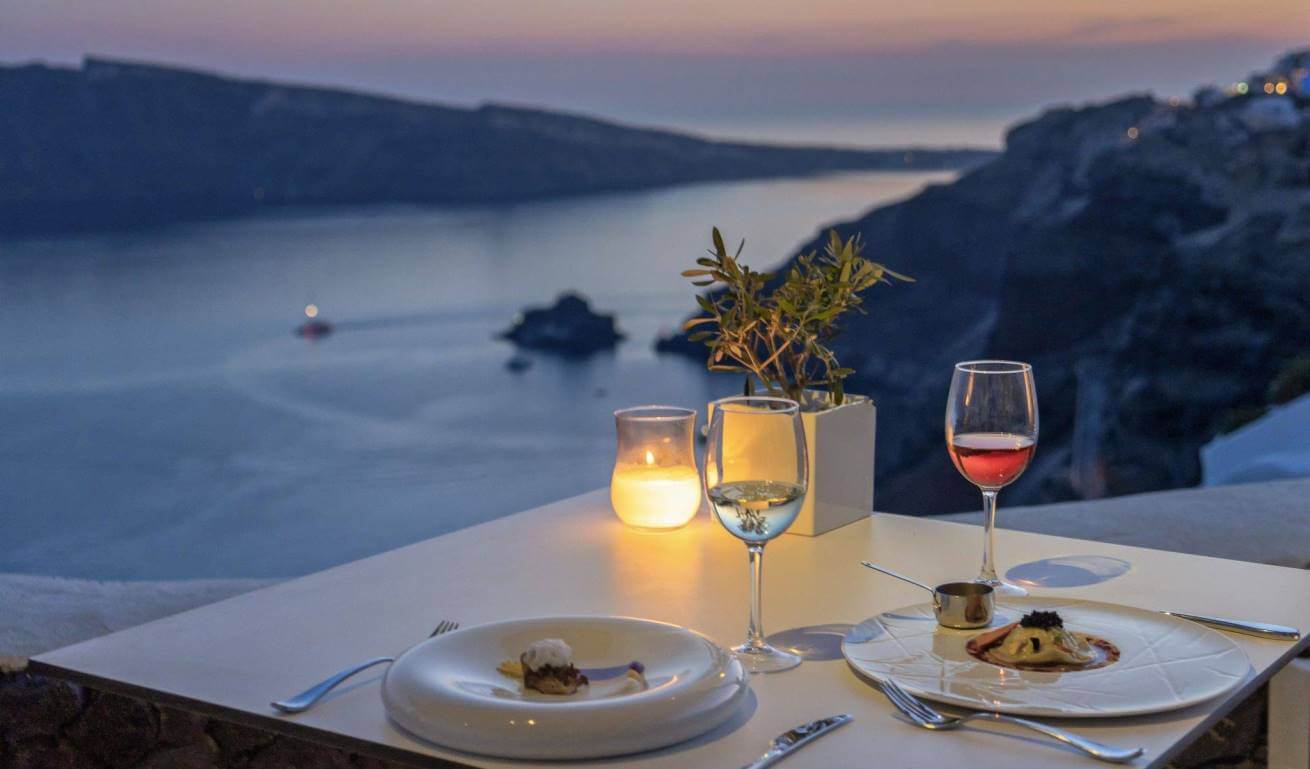
Enjoying local wine paired with high-quality cuisine against the backdrop of Santorini’s stunning vistas | © P. Merakos
Nestled in the heart of the Aegean Sea, Greece’s famous Cyclades Islands, known for their stunning landscapes and cerulean waters, are home to a vibrant winemaking scene that seamlessly weaves together a rich historical legacy, sustainable practices and a deep reverence for the local terroir. The archipelago’s unique microclimates, characterised by strong winds, continuous sunshine, minimal rainfall and volcanic soils, contribute to the distinct environmental traits that shape its wines. These growing conditions impart a wonderful minerality and complexity to the wines, distinguishing them from their international counterparts. In recent years, winemakers in the Cyclades have also adopted green farming principles, reflecting a commitment to preserving the islands’ delicate ecosystems. Many wineries prioritise organic and biodynamic cultivation methods, respecting the land’s natural balance while producing wines that authentically reflect the region’s unique characteristics. This sustainable approach not only ensures the long-term health of the vineyards but also resonates with a global movement toward heightened environmental awareness.
Among the handful of islands in the Cyclades, Santorini is a must-visit for those looking to sample distinctive Greek wines. Renowned for its volcanic soil, ancient vines and breathtaking sunsets, Santorini is the poster child for Greece’s “wine islands”, offering a treasure trove of wineries ripe for exploring. Among the famous names, Domaine Sigalas in Oia stands out for its traditional approach, utilising the centuries-old “kouloura” (basket) pruning method to craft crisp and mineral-driven Assyrtiko wines that epitomise the island’s essence.
Venetsanos Winery, perched on a stunning cliffside location above the port of Athinios, is another notable establishment on Santorini’s west coast that harmoniously blends modernity and sustainability with tradition. Run by the Venetsanos family, whose experience in winemaking spans decades, this estate was the first industrial winery on the island. Now, more than 70 years since its inception, Venetsanos Winery continues to uphold its legacy, producing an excellent selection of red, white and sweet wines using Assyrtiko, Athiri, Aidani, Platani, Mavrotragano and Mandilaria grape varieties.
Further north, Vassaltis Vineyards also captures Santorini’s spirit by showcasing indigenous grape varieties and implementing organic viticulture. Although one of the island’s newer wineries, this has no impact on the quality of its viniculture visitors can expect to sample some of the region’s finest wines here, including Vassaltis’ signature Assyrtiko expression, brimming with aromatic notes of ripe tropical fruits, honeysuckle and seawater, rounded off with the perfect levels of minerality and acidity. The island’s inland, meanwhile, plays host to the award-winning Hatzidakis Winery, another frontrunner in organic and biodynamic practices that produces stellar wines using endemic grapes.
Tinos and Sikinos, two other magnificent islands in the Cyclades archipelago, boast burgeoning wine scenes highlighted by preeminent wineries embodying their unique terroirs’ lifeblood. On Tinos, T-Oinos Winery deserves special mention. Celebrated for its commitment to organic viticulture and the revival of ancient grape varieties, this estate crafts wines that mirror the island’s rugged beauty. Its collection, spearhead by experienced winemaker Stephane Derenoncourt, features phenomenal Assyrtiko- and Mavrotragano-driven wines meticulously produced from grapes picked and sorted by hand. By the same token, Manalis Winery on Sikinos enchants with its dedication to sustainable practices, creating small-batch, high-quality wines from arid Cycladic varieties that depict the island’s sun-kissed slopes and maritime influences. Endeavouring to keep its viniculture as natural as possible, this estate’s red, white and rosé wines epitomise a true love and passion for the craft that honours bygone eras of winemaking.
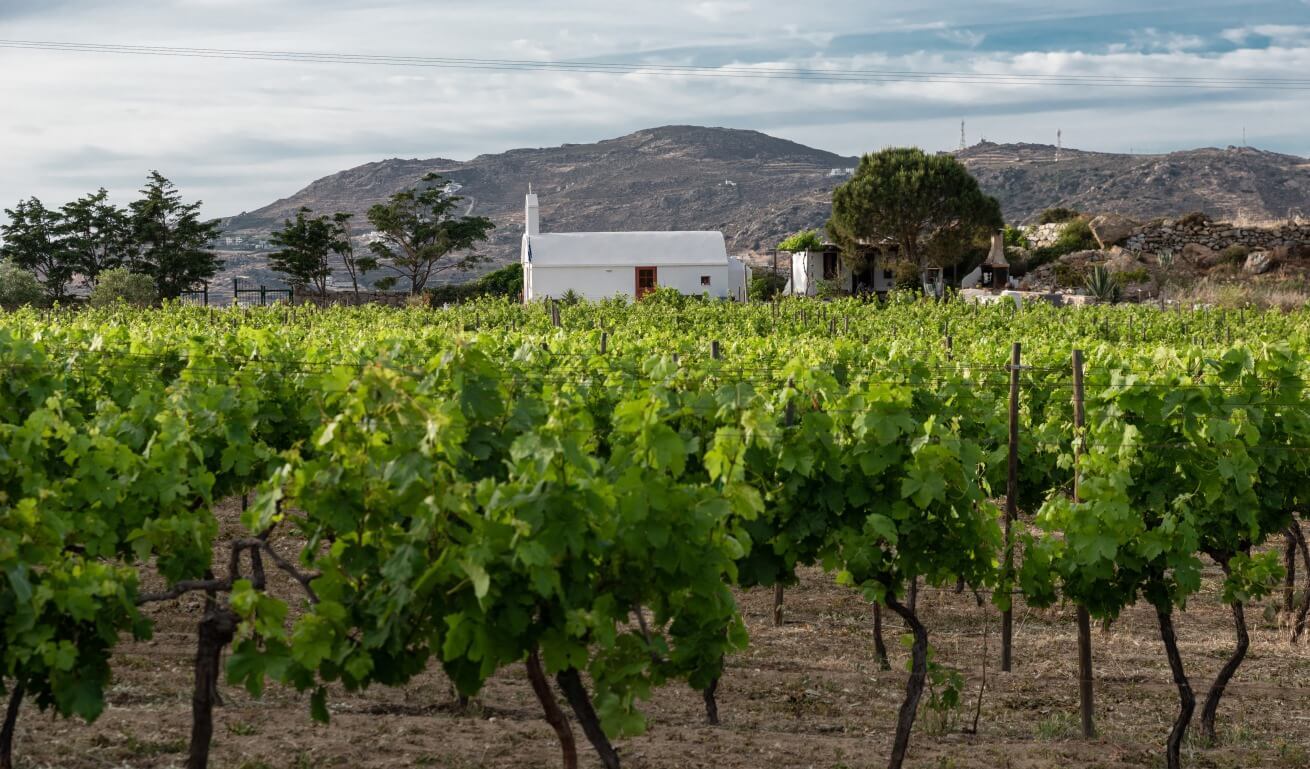
Naxos Winery | © S. Antimanto
The North Aegean islands of Greece, with their breathtaking beaches and prominent links to Greek mythology, showcase a rich winemaking heritage that encapsulates the region’s storied past, dynamic present and promising future. Several wineries in this region prioritise environmentally friendly, organic and biodynamic cultivation methods, thereby safeguarding the islands’ multifaceted ecosystems and distinctive terroir while nurturing the vines of acclaimed indigenous grape varieties.
The winemaking roots of the Northern Aegean islands trace back to ancient times when maritime trade and cultural exchange played a pivotal role in shaping viticultural techniques. Although winemaking on these islands waned over time, recent decades have witnessed a resurgence driven by a fusion of traditional wisdom and contemporary methods. Samos, an intriguing island steeped in history and folklore, is the perfect example of this vinicultural renaissance. One of the island’s most prominent producers, UWC Samos (United Winemaking Agricultural Cooperative of Samos), stands as an international endorsement of the region’s viticultural quality, representing the collaborative efforts of local grape growers and winemakers. Founded in 1934, this cooperative has played a vital role in cultivating and producing high-quality wines for generations. Its primary mission is to promote and preserve the unique terroir of Samos, known for its exceptional vineyards and ideal grape-growing conditions. The cooperative’s flagship grape is the Samos Muscat, which represents 98% of the vineyards planted on the island and produces a sweet wine with rich, aromatic qualities.
Over and above sampling the wines produced by local grape growers, tourists visiting Samos can explore the cooperative’s facilities and sustainable vineyards, gaining insight into the island’s winemaking heritage. Guests can also stop at the Wine Museum of EOS Samos to view impressive wine collections and exhibits that divulge the island’s winemaking legacy and longstanding ties with the Muscat grape.
Lemnos, another gem in the North Aegean, plays host to Chatzigeorgiou Estate, a winery that’s making great strides in rejuvenating the island’s winemaking legacy. Once touted by Aristotle for producing exceptional quality wines during ancient times, Lemnos has the art of viniculture deeply ingrained in its history – and the privately owned Chatzigeorgiou Estate proudly adopts this tradition of enological excellence, crafting exceptional classic and rare wines that are all vinified, aged and bottled on-site.
Chios, famed for its medieval villages and mastic production, also commands a notable presence in the Greek vinicultural landscape. With a winemaking history that dates back to 500 B.C., most of Chios’ vineyards are scattered within the mountainous northern regions and include varieties such as Chian Krasero, Assyrtiko and Roditis. Ariousios, one of the wineries set within the island’s sun-drenched highlands, has made a global name for itself with its charismatic wines that honour Chios’ heritage. A true trailblazer, Ariousios was also the first estate to build a modern wine-producing facility on the island and the inaugural local winery to export Chian wines to the USA in the 21st century.
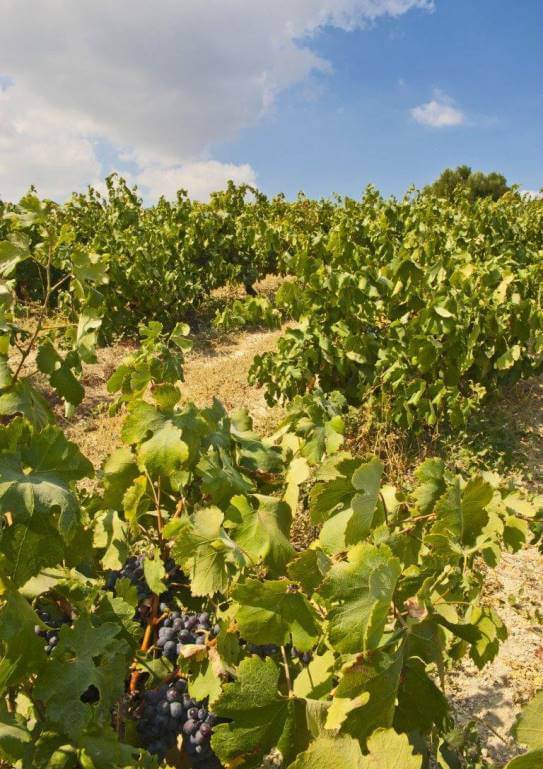
Heraklion Achentrias Vineyards | © Y. Skoulas
The Dodecanese Islands, a sun-kissed archipelago in the southeastern Aegean Sea, boasts a winemaking tradition that is as vibrant and unique as the region itself. Suffused in history, enriched by sustainable practices and highlighted by exceptional wineries, the vinicultural scene in the Dodecanese Islands offers a riveting odyssey of taste and culture.
With a heritage tracing back centuries, these islands served as a crossroads of civilisations, from the ancient Greeks and Romans to the Byzantines and Ottomans, all leaving their mark on the local vine agriculture. This led to the cultivation of a wide range of indigenous grape varieties, including Athiri and Mandilaria, which have all continued to flourish amidst the islands’ dry and hot weather.
At its core, from millennia past to the modern day, wine has always been a social beverage, accompanying special moments among friends, family and loved ones — and it’s precisely this idea that guides the work of Ktima Akrani, a sustainable winery on the island of Kos. Although no longer a word commonly used, the name Akrani means “companion” and indicates the winery’s vision of being a place where people can come together and enjoy each other’s company, united over their shared appreciation for wine. Using this as their inspiration and combining it with their profound love for Kos’ beauty and history, this family-run estate presents an array of complex, character-filled wines that reflect the local soil’s distinct profile and the vintner’s devotion to revivifying Greece’s rare grape varieties to their deserved glory.
In the lesser-known corners of the Dodecanese, the serene island of Lipsi also offers an unexpected oenological treasure — Lipsi Winery. Albeit a boutique estate, Lipsi holds its own in producing world-class wines using the rare Fokiano grape, alongside the endemic Assyrtiko and Athiri varietals. With deep ties to the community, this eleven-acre vineyard embraces organic and sustainable practices that reflect a profound respect for the land and an unyielding passion for top-quality viniculture.
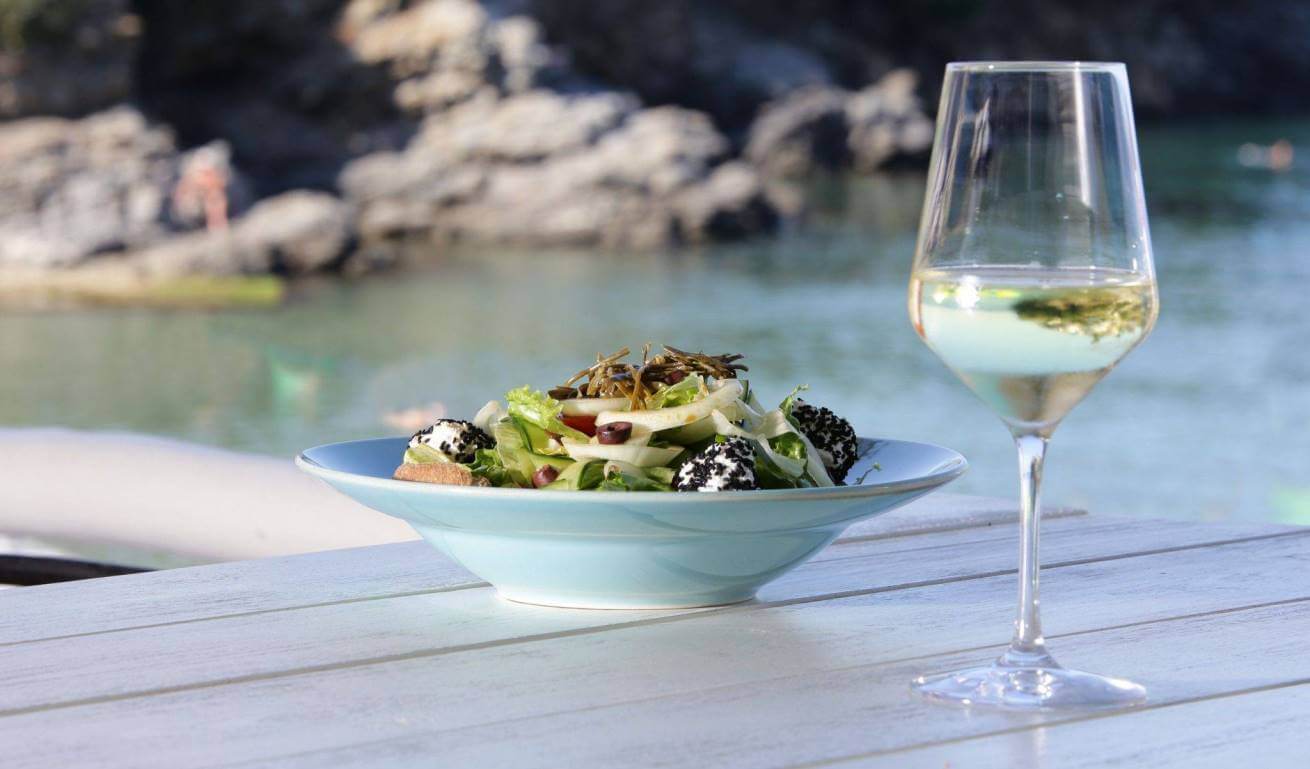
A perfect pairing: Greek cuisine with Cretan wine | © E. Fragou
Situated in the southern expanse of Greece, Crete, an ancient cradle of civilisation, harmoniously weaves together tradition and modernity in its winemaking endeavours. Rooted in a history dating back to the Minoan era, the island’s winemaking heritage has endured, safeguarding time-honoured methods and grape varieties that have witnessed centuries unfold. Pioneering commercial wine promotion and export as early as 2700 B.C., Crete etched its reputation on Mediterranean trade routes, a legacy that resonates through its vineyards and cellars today, showcasing the resilience and innovation of its vintners.
Crete’s diverse landscapes encompass coastal plains and rugged mountains, fostering myriad microclimates that infuse its wines with a symphony of flavours and aromas. Recent years have seen an ardent embrace of sustainability among the island’s winemakers, a commitment supported by its unique ecosystems and profound kinship with the land. Organic and biodynamic practices have become commonplace, echoing a deep respect for nature while crafting wines that exude the region’s innate characteristics. This devotion extends beyond the vineyards, encompassing responsible water management, energy conservation and biodiversity preservation, a testament to Crete’s aspiration to perpetually protect its natural treasures.
Two shining examples of Crete’s dedication to sustainability are Dourakis and Manousakis wineries, which both employ biodynamic practices to grow indigenous grape varieties, allowing guests to savour the island’s soul while treading lightly on the earth. Further east, Lyrarakis Wines is another Cretan establishment that has risen to fame in the vinicultural industry. Established in 1966, Lyrarakis seamlessly interlaces tradition and innovation with environmental stewardship, championing indigenous grape varieties, particularly those endemic to Crete, like the ancient Dafni, Plyto and Melissaki varietals. Produced from 140 acres of gravel- and limestone-permeated soils, Lyrarakis Wines’ diverse, high-quality portfolio encompasses an array of styles, from crisp whites to robust reds, each echoing the subtleties of the region’s remarkable landscape.
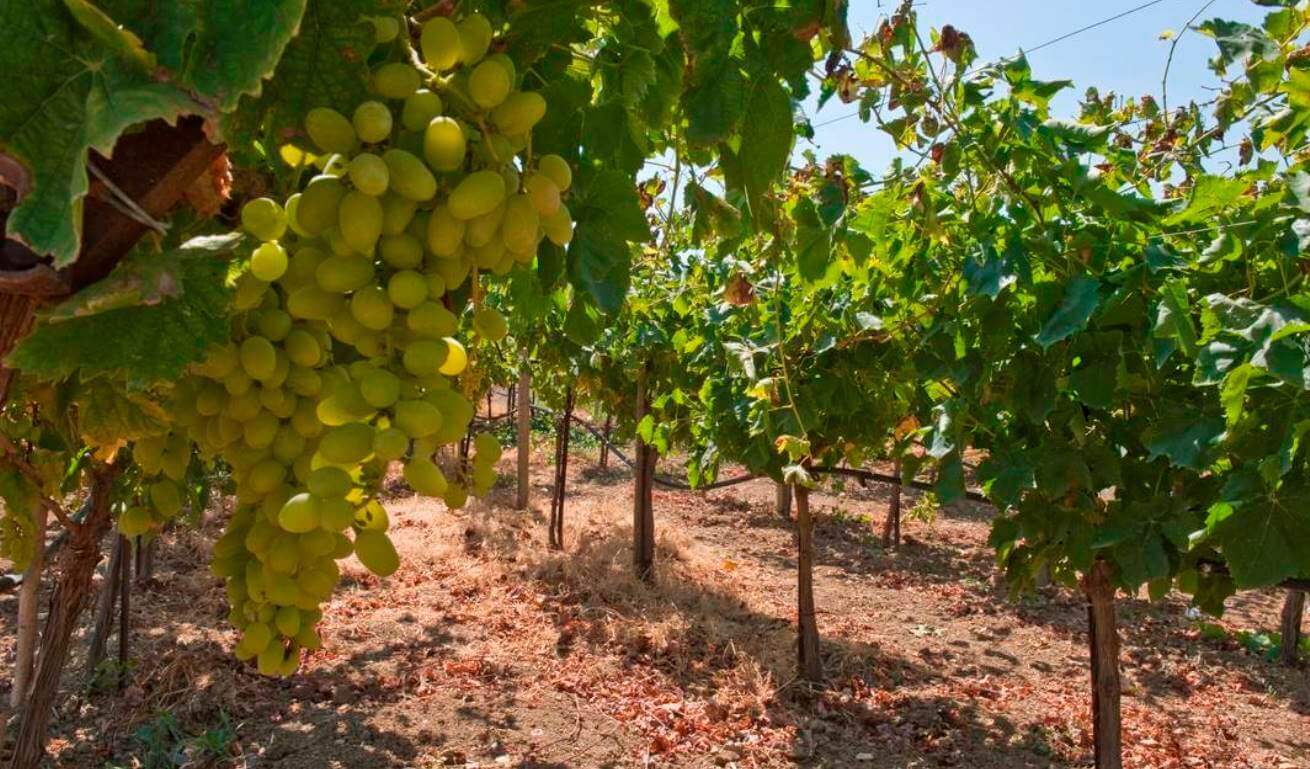
Heraklion Achentrias Vineyards | © Y. Skoulas
With their lush surroundings and ubiquitous maritime influences, Greece’s Ionian Islands have nurtured a unique winemaking culture, spotlighting indigenous vines and a steadfast dedication to non-invasive, eco-friendly practices. The winemaking legacy of the Ionian Islands stretches across centuries their strategic positioning along ancient trade routes facilitated the exchange of knowledge and grape varieties, resulting in the distinctive winemaking techniques and grape selections that define the archipelago at present.
Among its constellation of superb wineries, Sclavos Winery, set on the island of Kefalonia, stands tall as the pioneer of organic viniculture in the region, leading the modern winemaking movement in the Ionian archipelago. By embracing natural winemaking techniques and championing sustainable agriculture, this family-operated gem – which boasts over 100 years of experience in wine production — channels the island’s exceptional terroir into each bottle it produces.
Gentilini Winery, also located on Kefalonia, shines as a luminary in Ionian winemaking, too. With a multigenerational patrimony, Gentilini’s tight-knit team masterfully nurtures native grape varieties, blending modern and traditional techniques to craft a small yet impressive selection of food-friendly wines. Its dedication to promoting the unmistakable flavours and aromas of Kefalonian grapes, paired with its spectacular location overlooking the Ionian Sea, renders Gentilini an essential stop for those eager to immerse themselves in the island’s vinicultural story.
Further north, on Lefkada Island, Lefkaditiki Gi Winery is another must-visit in the Ionian archipelago. Driven by a desire to produce wines of the utmost distinction, this estate blends age-old winemaking know-how with modern facilities to showcase the beauty of the island’s indigenous grape varieties, namely Vardea and Vertzami. As a cultural and oenological hub, Lefkaditiki Gi offers an immersive encounter, inviting visitors to explore the interwoven narratives of wine, history and innovation.
SPORADES SPOTLIGHTING SERENITY AND SUSTAINABILITY
Comprising Alonissos, Skiathos, Skopelos and Skyros, the spellbinding Sporades island cluster has fostered a longstanding wine culture that extends back to antiquity, with historical texts referencing vine cultivation. Now, in the modern age, the wineries’ fusion of tradition and innovation, entwined with the islands’ unique terroirs, ensures that each bottle of Sporades wine offers an evocative journey through both time and place. Whether wandering through the vineyards or savouring the estates’ finest creations, visitors to the Sporades become immersed in a world of flavours that reflect its landscapes’ charm and vintners’ dedication.
The archipelago’s diverse geography and varying altitudes, in combination with its distinctive soils, coastal proximity and optimal sun exposure, have synergistically shaped the essence and qualities of Sporades wines. In resonance with the islands’ natural splendour, Sporades wineries prioritise ecologically sound cultivation, aiming to conserve the region’s unique ecosystems while lending a distinct character to local wines. From minimised chemical usage to soil rejuvenation, sustainability is intricately woven into the fabric of the islands’ viniculture.
Arguably the Sporades’ most influential winery, Parissis, spread across 35 acres of fertile land on Skiathos, has played a vital role in reviving the region’s winemaking heritage. A family-run affair, this esteemed estate cultivates indigenous Greek grape varieties with precision, including Malagousia, Roditis, Assyrtiko, Xinomavro and Moschato Alexandria varietals. As the only commercial vineyard on the island, guests can look forward to exploring its elevated vines amidst panoramic vistas, sipping on stellar white and red wines while immersing themselves in the rich history and dedication to quality that defines Parissis.
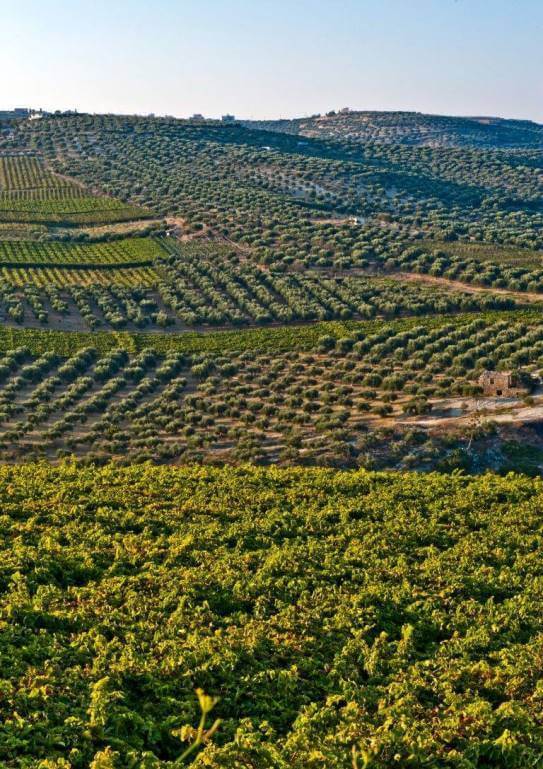
Heraklion Achentrias Vineyards | © Y. Skoulas
Situated off the eastern coast of mainland Greece, Evia Island boasts a dynamic winemaking scene steeped in centuries of tradition, a resolute dedication to sustainability and a rich array of indigenous grape varieties. The island’s varied topography, spanning from coastal regions to mountainous terrain, deep valleys and broad open fields, lends itself to the cultivation of mostly (around 80%) white grapes, resulting in wines with mild yet distinctly nuanced flavour profiles.
Standing out among Evia’s noteworthy wineries is Vriniotis, a family-run estate that has garnered acclaim for the revival of extinct grapevines native to the island’s northern territory. Rooted in a family with deep-seated connections to the region, the winery is a living embodiment of Evia’s vinicultural legacy. Spanning 100 acres, the estate’s mineral-rich soils and abundant sunshine offer the optimal conditions for the cultivation of an array of vines, from Aidani to Assyrtiko, Malagouzia, Monemvasia, Mavrokountoura and Vradiano, a rare red grape endemic to northern Evia. This, paired with the vintner’s dedication to sustainable viniculture and minimal intervention winemaking, translates into wines that eloquently articulate the island’s incredible terroir.
As wine enthusiasts traverse these Greek isles, from north to south and east to west, they will uncover how Greece’s rich cultural heritage is impeccably interwoven with its commitment to sustainable farming practices, fostering a wine industry that is both a guardian of tradition and a trailblazer of innovation. With each island boasting its unique terroir and indigenous grape varieties, visitors are invited to indulge in a sensory journey that spans ancient vinicultural roots to modern eco-conscious endeavours. In Greece, travellers have the opportunity to embrace not just the pleasure of exceptional wines but the celebration of nature’s abundance and the promise of a harmonious future.


